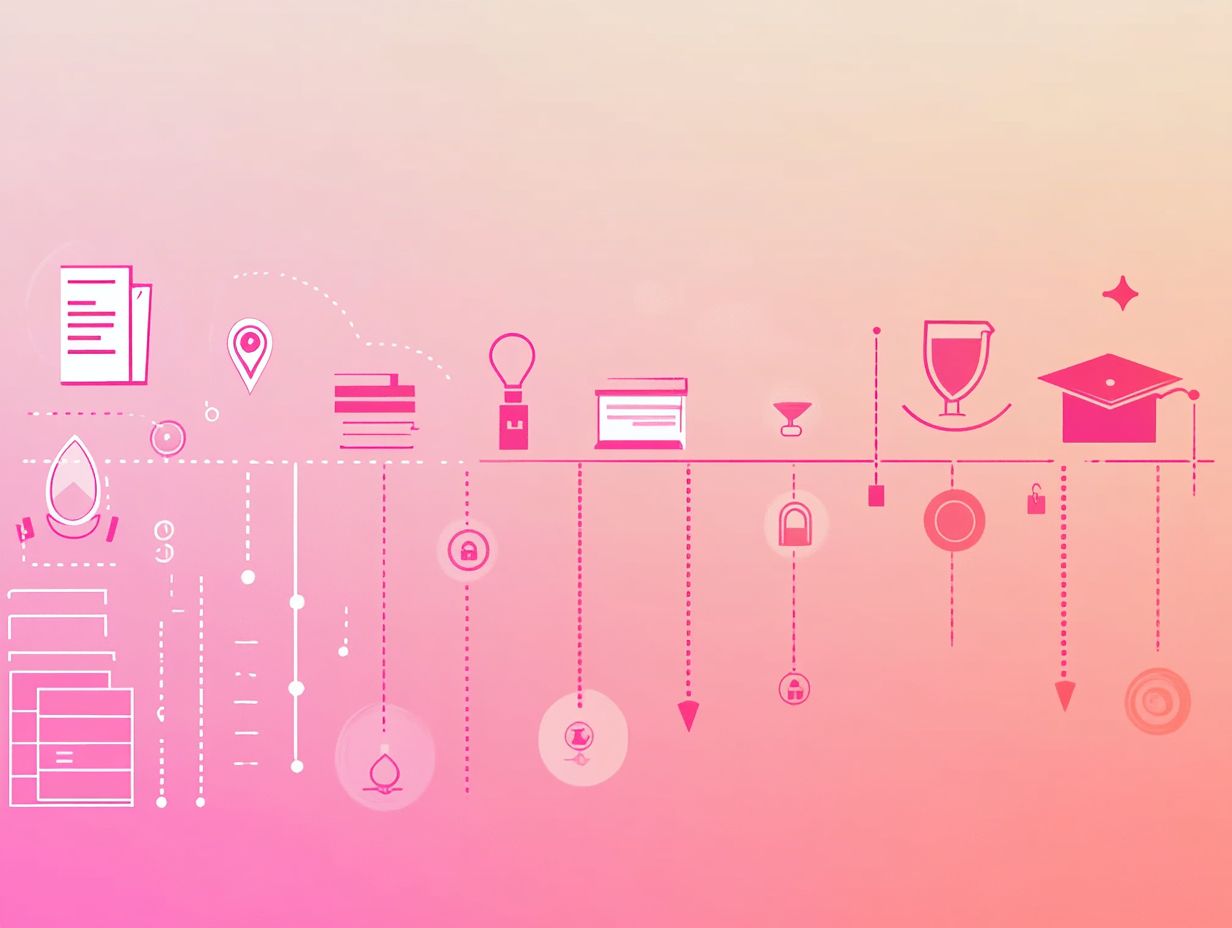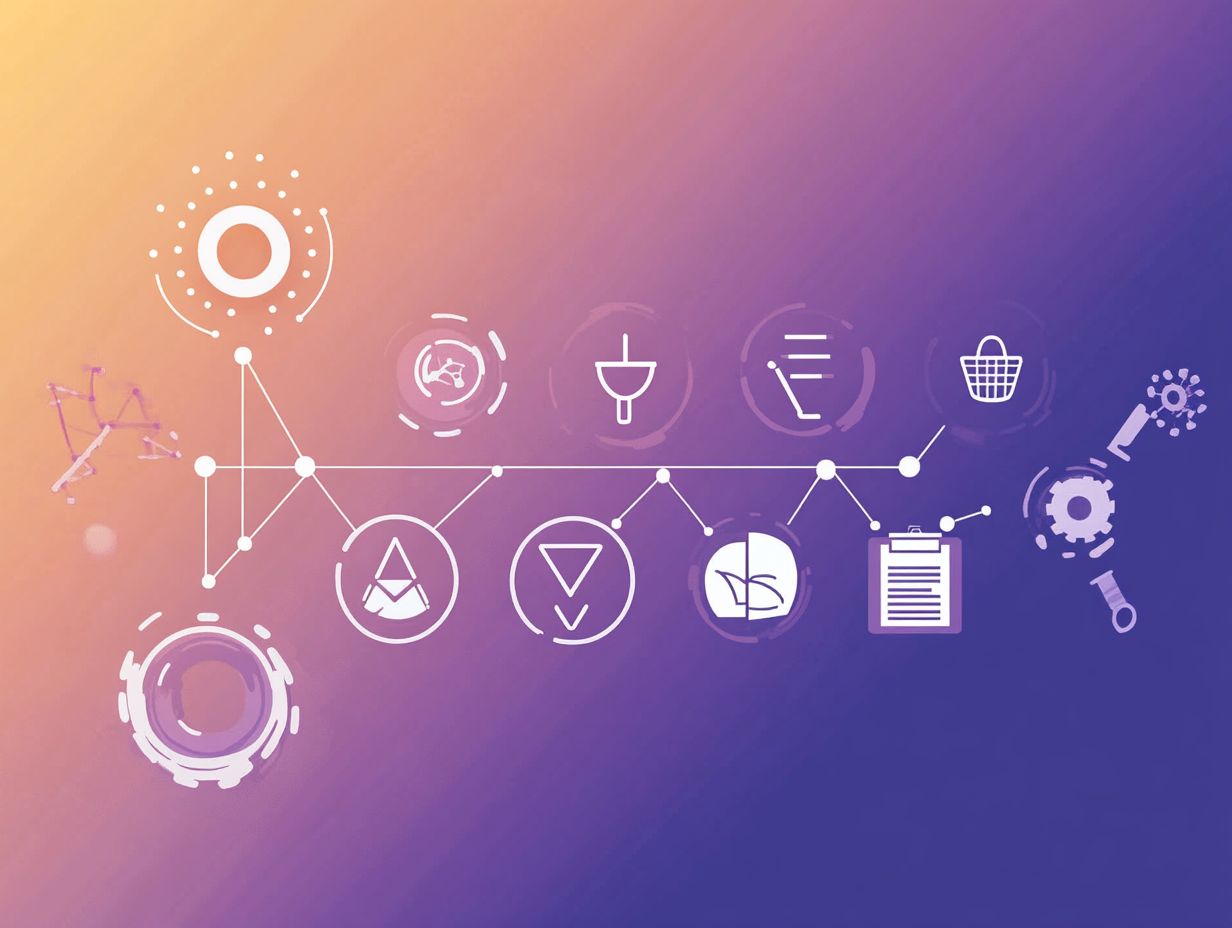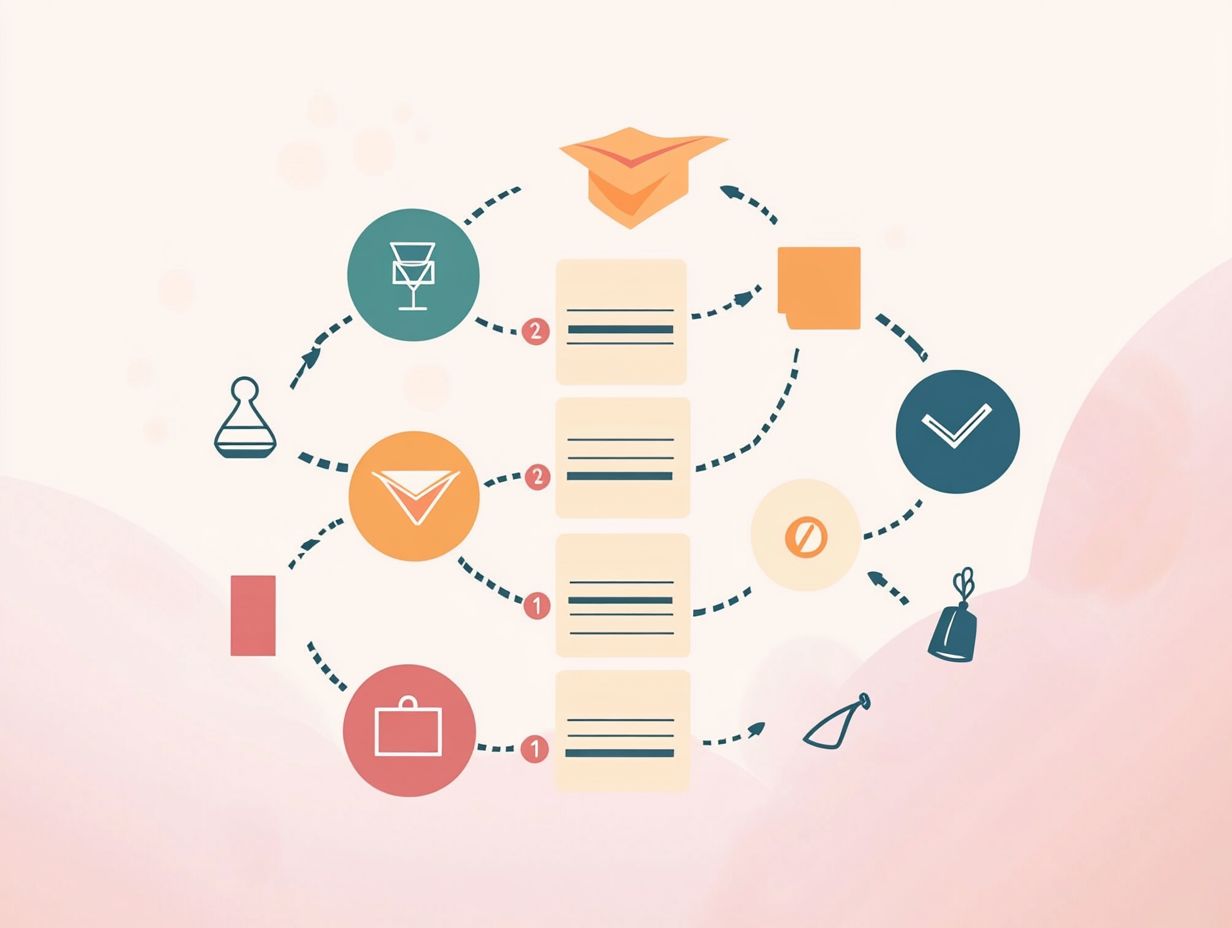Understanding the Timeline of a Doctoral Program
Starting a doctoral program is a big commitment that requires careful thought and planning.
This overview explains what a doctoral program includes and highlights essential factors to consider when choosing one. From grasping key milestones and phases to successfully navigating the initial years of coursework, qualifying exams, and dissertation research, this guide will help you every step of the way!
Whether you are contemplating the pursuit of a doctorate or are already on that journey, this resource equips you with the insights necessary for success.
Contents
Key Takeaways:

- A doctoral program typically lasts 4-6 years and involves coursework, research, and a dissertation project.
- When choosing a doctoral program, consider factors such as program reputation, funding opportunities, and research interests.
- The timeline of a doctoral program includes key milestones such as qualifying exams, dissertation proposal, and dissertation defense.
Overview of a Doctoral Program
A doctoral program, leading to a PhD or a similar degree, stands as the pinnacle of academic achievement. It invites you to immerse yourself deeply in your research interests and produce original work that makes a significant contribution to your field.
This journey usually takes several years and is marked by rigorous academic milestones, including graduate coursework, thorough exams, and, ultimately, a dissertation. The dissertation is not just a requirement; it’s the main proof of your expertise and scholarly contributions.
Engaging in teaching assistantships offers financial support and valuable academic experience, allowing you to mentor others while honing your own skills.
What is a Doctoral Program?
A doctoral program is an advanced academic journey crafted to cultivate your expertise in a specific field, ultimately leading to the attainment of a PhD or an equivalent doctoral degree.
These programs are designed to immerse you in rigorous coursework, intensive research, and the development of critical thinking skills, enabling you to contribute original ideas to your area of study.
The primary goals of such a program often include honing your independent research capabilities, fostering analytical skills, and instilling a profound understanding of the existing body of knowledge within the academic community.
As a successful candidate, you not only advance your personal and professional growth but also acquire the ability to influence your discipline. Engaging actively with the scholarly community enhances your experience, promoting collaboration and opening doors to impactful research that pushes the boundaries of knowledge.
Choosing a Doctoral Program
Selecting the right doctoral program is a crucial decision that relies on aligning your personal research interests with the various PhD offerings available.
It s also essential to consider the opportunities for teaching assistantships and potential upgrades to a Master of Philosophy degree that could enhance your academic journey.
Factors to Consider

When evaluating PhD programs, you must consider a multitude of factors, such as the expertise of the faculty committee, the quality of graduate coursework, and how well the program aligns with your proposed research interests.
The program’s accreditation is crucial; it ensures that your education meets rigorous academic standards and is respected within your field. You should also assess the alignment of faculty research with your own passions and goals to ensure that your aspirations resonate with those of your potential advisors.
Access to a wealth of resources like libraries, labs, and funding opportunities can greatly enrich your doctoral experience. Additionally, networking opportunities within the program and at conferences can open doors for future collaborations and job prospects.
Crafting a compelling research proposal that reflects your academic ambitions is equally vital, as it establishes a clear vision and direction for your studies.
Timeline of a Doctoral Program
The timeline of your doctoral program typically spans several years, marked by critical academic milestones.
You will engage in challenging classes, take important exams, embark on the intricate journey of dissertation writing, and accumulate the essential credit hours needed for graduation.
Each step is designed to deepen your expertise and prepare you for future challenges.
Key Milestones and Phases
Key milestones in your doctoral program include the qualifying exam and comprehensive exam, both serving as crucial academic checkpoints that assess your knowledge and readiness for dissertation work.
These pivotal assessments challenge you and ensure you possess a deep understanding of your field before engaging in independent research.
Preparing for these exams will require extensive study of core material and thoughtful discussions with peers and advisors to solidify your grasp of complex topics.
Once you successfully navigate these milestones, you will transition from coursework to dissertation research, marking a significant evolution in your academic journey.
This shift not only signifies your commitment to advancing knowledge but also represents the culmination of years of rigorous training and intellectual development.
As you delve into your dissertation topics, you will begin to contribute original insights to your chosen discipline, paving the way for future academic and professional endeavors.
First Year of a Doctoral Program
In the first year, you will typically encounter challenging classes that immerse you in foundational knowledge.
This is an exciting time to lay the groundwork for your future research while actively engaging with the academic community through teaching assistantships and networking opportunities.
Coursework and Research

In your first year, graduate coursework is essential for building a solid knowledge foundation, while teaching assistantship opportunities sharpen your practical skills and help you explore your research interests.
You will find various foundational classes tailored to your specific discipline, covering theoretical frameworks, methodologies, and ethical considerations relevant to your field.
These classes equip you with crucial concepts and encourage engaging discussions that deepen your understanding.
As you navigate this coursework, strive to balance academic demands with hands-on research projects, fostering a profound connection between theoretical knowledge and real-world applications.
Embracing this dual approach is vital, as it prepares you to make meaningful contributions to your chosen area of study, shaping both your academic journey and professional trajectory.
Second Year of a Doctoral Program
In the second year, your focus shifts to preparing for the qualifying exam and creating a strong dissertation proposal. These are essential academic milestones that affirm your readiness for independent research at the graduate level.
Qualifying Exams and Dissertation Proposal
Qualifying exams serve as a crucial rite of passage during your second year, pushing you to showcase your comprehensive understanding of your field while fine-tuning your dissertation proposal.
These exams assess your depth of knowledge and critical thinking skills, playing a pivotal role in shaping your academic journey. As you prepare, developing effective study strategies is essential.
- Create a structured study timeline.
- Engage in study groups.
- Utilize academic resources to enhance your preparation.
Meeting the high expectations set by your faculty boosts your confidence and equips you with the essential skills needed to craft a compelling dissertation proposal.
This preparation phase illuminates your strengths and areas for improvement, offering valuable insights that will inform and elevate your future research endeavors.
Third Year of a Doctoral Program
In the third year, you will likely immerse yourself in intensive dissertation research and writing. This is a pivotal time when you collaborate closely with your faculty committee to refine your research direction.
Your efforts will culminate in the production of a substantial body of scholarship that significantly contributes to your field.
Dissertation Research and Writing

Dissertation research and writing demand meticulous planning and execution as you gather data, analyze findings, and draft your dissertation under the guidance of your faculty committee. You will also accumulate the necessary credit hours along the way.
As you navigate this intricate journey, it’s crucial to select approaches that fit your research goals whether qualitative, quantitative, or a blend of both. This choice will significantly influence your data collection strategies and the overall analysis process.
Revisions are crucial throughout your work, allowing you to refine your arguments and enhance clarity. The feedback from your committee members is invaluable, guiding you through each stage and ensuring that you adhere to academic standards.
This collaborative effort not only shapes your final document but also deepens your understanding of your research topic. Ultimately, it enables you to make a meaningful contribution to your field.
Fourth Year and Beyond
The fourth year typically marks a pivotal moment in your academic journey, as you focus on completing your dissertation and preparing for the defense.
These are not just tasks; they are essential milestones that validate years of dedicated research.
Completing and Defending the Dissertation
Completing and defending your dissertation is an exciting milestone in your doctoral journey! It requires you to articulate your research findings and demonstrate your expertise before an academic community.
This pivotal moment marks not only the culmination of years of hard work but also serves as a platform to showcase your unique research interests and insights.
Preparing for your defense is crucial this is your moment to shine! You’ll need to conduct a thorough review of your dissertation and craft a compelling presentation that succinctly conveys your core arguments and methodologies.
Anticipating a range of questions from the committee is essential. This reflects both your findings and their potential implications within your field. Mastering effective presentation techniques, such as engaging storytelling and clear visuals, can significantly enhance your delivery, ensuring that your audience fully grasps the significance of your work in the broader academic landscape.
Post-Graduation Opportunities
As a PhD recipient, you have many post-graduation opportunities. You can work in academia, research institutions, or industry, all while making meaningful contributions.
These paths let you use your knowledge. They also encourage you to apply the critical thinking, analytical skills, and problem-solving abilities you’ve developed during your studies.
In academia, you can teach and mentor the next generation of scholars. In industry, you may work on applied research, driving impactful technological advancements.
Research institutions are eager for PhD holders like you. They want your expertise to lead new studies that change existing ideas in your field.
The routes available to you are exciting and varied. They ensure that the skills you’ve honed during your PhD journey are celebrated.
Frequently Asked Questions
What is a doctoral program?
A doctoral program is the highest academic degree in a specific field. It requires extensive research, coursework, and a dissertation or final project.
What is the timeline of a doctoral program?
The timeline varies, but on average, it takes 3-5 years to complete.
What are the different stages of a doctoral program?
Stages typically include coursework, comprehensive exams, research, and writing a final dissertation or project.
How long does the coursework stage typically last?
Coursework lasts anywhere from 1-3 years, depending on the program.
What are comprehensive exams and when are they taken?
Comprehensive exams assess a student’s knowledge and are usually taken after coursework is complete. They precede the research and writing stage.
Is there a maximum timeline for completing a doctoral program?
Average completion is 3-5 years, but many programs have a maximum timeline of about 7-8 years.






